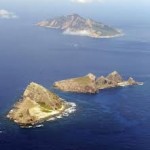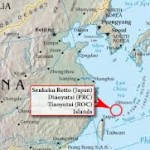This morning in Dalian, there were no all-city sirens and alarm bells at 9:18. Yesterday, though, the Chinese loudly remembered what they consider perhaps their greatest national humiliation, an injury that they just won’t let go: the invasion of northeastern China by Japanese forces in 1931. They just call it “9-18”. It’s eighty-one years now, but if anything the memories are recently growing more bitter, as the obscure islands in the East China Sea — now, does Japan call it that? — that are claimed by both countries become a renewed source of hostility.
The People’s Republic of China says the Diaoyu Islands are theirs. (Actually, it says these islands belong to Taiwan, but that Taiwan belongs to mainland China, the PRC.) The Republic of China agrees, though it prefers the spelling Tiaoyu Islands. (It, however, also insists that it is a sovereign nation, so that’s a bit of a disagreement.) And although these tiny islands are quite close to Taiwan, Japan calls them the Senkaku Islands and says they are in charge, since these hunks of rock extend from a curving spine of islands running south and west from Japan. Oh, and did I mention that nobody lives there? This is as ridiculous as countries fighting over, I don’t know, sovereignty of the goats that live on those Falkland Islands east of Argentina. (Oh, right. That’s been done. Britannia Rules the Goats!)
While there are no people, there’s oil under them thar islands. (Surprise!) The Canadian government has taken a sudden interest in the far North, and the easier navigation and oil removal that some see as a silver lining (lots of silver…) to global warming. Japan and the Chinas suddenly wax patriotic (since the 70s, when oil reserves were first scoped out, but ever more fervently) over territorial waters they hadn’t deigned to notice before.
There have been riots here. (You’ll find reports today in any decent newspaper – the Times of New York or L.A. and Canada’s Globe and Mail certainly do, but I can’t link you to them; the Great Firewall maintenance crew is working overtime on this one.) Anti-Japanese sentiment is another potent fuel source in China, and it’s not nearly so far underground as the offshore oil reserves are. Any Chinese leader (or wannabe demagogue) who decides that patriotism is more valuable than Japanese trade can start fierce and instantaneous fires in this country. China thinks of itself as the fountain of Asian culture and history, and the period of domination by a “little brother” like Japan was not only brutal and devastating in all the usual ways of war and occupation, but also humiliating in a way that, ultimately, I know I just don’t get (and never will). As the sirens wailed yesterday, I heard this bitter, ever-present grievance. (Japan has never formally apologized for its Imperial atrocities of the 1930s and ’40s, and apparently its textbooks fail to mention adequately what, in China, are considered the greatest war crimes in a century full of them.) In this place, embarrassment is a wound that doesn’t seem to heal, and it has begun to fester.
Surely to goodness the Chinese wouldn’t go to war for oil – they are, or can be, deeply thoughtful students of history, but then the United States proved that the United Nations would be no stop to its ambitions for security (oh, that infinitely definable word!) in 2004. In 2009, when I first moved to my city across the Yellow Sea from the Koreas, tensions there had me whistling in the dark and making bad jokes about having front row seats for the second Korean war. Now I mutter nervously about saner heads and diplomacy and does anybody know the way to the high road here?


